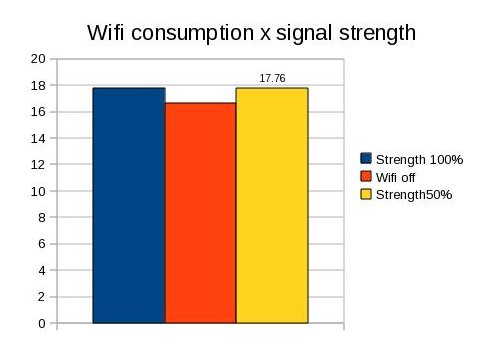Wifi Power consumption
The test aimed at wifi power consumption. BLTK have been used to measure raw power consumption of connected wifi but without real data transmission. The laptop described below is installed with Fedora 11.
Hardware
LENOVO ThinkPad T61 * CPU Intel Core2 Duo CPU T7100 1.8 GHz * Intel Corporation Mobile GM965/GL960 Integrated Graphics Controller * LCD 14" 1440x900x24 * 2 GB of memory * HDD Hitachi 100 GB * Battery designed capacity 56.16 Wh / usable capacity 40.96 Wh
Test description
The test was done using BLTK and its Office workload. The were used three use cases
- wifi on - the laptop was near to the AP. Signal strength almost 100%.
- wifi of
- wifi on - the laptop was on another floor as the AP. Signal strength ~ 50%.
The office workload has been repeated four times:
bltk -O -n 4
Measurement was done three times for all use cases.
Results
| Wifi strength [%] | Power Drain [W] | Bat-life [min] |
|---|---|---|
| 100 | 17.76 | 189 |
| 100 | 17.83 | 188 |
| 17.795 | 188.5 |
| Wifi strength [%] | Power Drain [W] | Bat-life [min] |
|---|---|---|
| off | 16.64 | 202 |
| off | 16.69 | 201 |
| 16.665 | 201.5 |
| Wifi strength [%] | Power Drain [W] | Bat-life [min] |
|---|---|---|
| ~50 | 17.76 | 189 |
| ~50 | 17.76 | 189 |
| 17.76 | 189 |
Conclusion
Wifi of tested laptop consumes against 1.1 W independent on signal strength when the laptop is connected but doesn't transmit any data. Due to battery state (usable aprox. 3/4 of designed capacity) switching wifi off can increase battery life about 9 minutes. This test should be extended about testing when the data is transmitted.

